Thought Leadership from IIMB Faculty: COVID-19 Insights
COVID-19: IIMB faculty respond with creativity to challenges and opportunities in public health, gender safety, business, IT and technology, start-ups, education and what this means for India and the world in the long term.
Read a selection of their published articles here:

M.S. Sriram
The Centre has reclassified the definition of what constitutes a small and micro enterprise. Will it help or hurt them, asks Prof. M.S. Sriram in Live Mint.

Gopal Naik
Even after COVID-19, there will be opportunities for some part of the educational and training content that can be delivered online to various segments, apart from creating opportunities for e-commerce, agriculture extension, healthcare, skill development and employment, write Prof. Gopal Naik and Narasingha Rao in Forbes India.
Read More
Rishikesha T. Krishnan
Prof. Rishikesha T. Krishnan, Director & Professor of Strategy at IIMB, and N. Dayasindhu, Co-Founder and CEO, itihaasa Research and Digital, explain that to become competitive, India should synthesise its production processes with new technologies and develop dynamic capabilities, in this article in The Hindu BusinessLine.

M.S. Sriram
In this article in Mint, Prof. Ankur Sarin, from IIMA, and Prof. M.S. Sriram, from IIMB, wonder whether the intent of the market regulator to create a stock exchange for the social sector will work.

Rishikesha T. Krishnan
The troika of Hero MotoCorp, Bajaj Auto and TVS Motor have built an unassailable position in India. What will it take to win other markets, especially Southeast Asia, ask Rishikesha T Krishnan, Director & Professor of Strategy, IIM Bangalore, and N. Dayasindhu, Co-founder and CEO itihaasa Research and Digital, in this article in Founding Fuel.

Vivek Moorthy
We must rectify the colossal failure of the discipline to consider a policy of shorter work hours if we want to rectify the blunders caused by a great inexcusable macroeconomics (GRIM) omission, Writes Prof. Vivek Moorthy, from the Economics & Social Sciences area at IIMB, in Mint.

M.S. Sriram
Prof. M.S. Sriram, Chairperson, Centre for Public Policy, at IIMB, examines the interconnectedness of the banking section and the contagion in this article in Business Standard .

U Dinesh Kumar
Banks and financial institutions must embrace the opportunity to leverage AI and ML to strengthen and revitalize their security and authentication framework, write Aparna Gupta and Prof. U. Dinesh Kumar, from the Decision Sciences area at IIMB, in Forbes India.

Rishikesha T. Krishnan
In this article in Hindu BusinessLine, Professors Shameen Prashantham and Rishikesha T Krishnan list and describe three strategies which can help increase the odds of harnessing healthcare innovations to provide socially inclusive solutions in developing countries, which the pandemic has made more urgent.

Rupa Chanda
Calls for self-reliance shouldn’t come in the way of India’s trade and investment negotiations with the EU, write Prof. Rupa Chanda and Pralok Gupta in Business Standard.

Ritu Tripathi
“When you examine the cognitive biases that are shaping your work-from-home experience, you can see that the productivity code lies in understanding the human mind, and yourself, better,” writes Prof. Ritu Tripathi, from the OB&HRM area at IIMB, in an article in Forbes India.
Read More
Rishikesha T. Krishnan,
Citing several recent success stories, Rishikesha T Krishnan, Professor of Strategy at IIMB, and N. Dayasindhu, Co-Founder of itihaasa Research and Digital, explain that self-reliance can be fostered by bringing tech universities and national labs to collaborate with industry on applied R&D projects in this opinion article in Hindu BusinessLine.
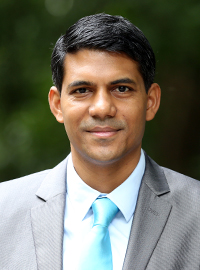
Jitamitra Desai
The coronavirus might linger on for many years, but effective e-commerce and hybrid fulfilment methods will help propel the retail industry forward and help retailers weather such storms now and in the future, write Ushasri T.S., Senior VP & GM Manhattan Associates (India) Development Centre, and Prof. Jitamitra Desai, from the Decisions Sciences area at IIMB, in this article in Business Today.
Read More
Rajendra K Bandi
Trump wants to impose restrictions on Twitter content through regulatory arm-twisting. Twitter wants to control Trump’s ability to communicate with his base by labelling his tweets. In an article in Forbes India, Sunil Reddy Kunduru, student of IIMB’s PhD program in Information Systems, and Prof. Rajendra K. Bandi, from the Information Systems area at IIMB, discuss what works better for the public good.
Read More
Kanchan Mukherjee
“We like to be in control of our destiny. We like to be in a state where we believe that we can affect our future by our own actions. The dual triggers of the pandemic and the lockdown destroyed this feeling of control,” writes Professor Kanchan Mukherji, from the OB&HRM area, in this article in Forbes India.
Read More
Ritwik Banerjee
With ‘externalities’ such as cost of treatment and fear of contracting Covid-19 hindering public health, it is upto the government to intervene and strengthen the system by increasing expenditure, write Prof. Ritwik Banerjee, from the Economics & Social Sciences area, and Priyama Majumdar, Research Associate, in Hindu BusinessLine.
Read More
Gopal Naik
In an article in Express Computer, Prof. Gopal Naik, faculty from the Economics & Social Sciences area, says proper quality assessment to reduce marketing costs and spoilage, improved information flow and better prices offered to farmers are key to reform the agriculture supply chain in the country .
Read More
Rupa Chanda
A post Covid-19 foreign trade policy must be cognisant of the evolving opportunities and challenges in services trade and must prepare domestic policies and capacity accordingly, write Prof. Rupa Chanda and Pralok Gupta in Business Standard.
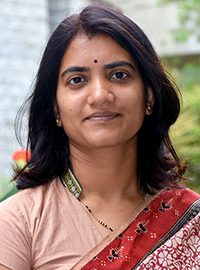
Sreelata Jonnalagedda
In an article in Deccan Herald, Prof. Sreelata Jonnalagedda, from the Marketing area at IIMB, and Anand Prahalad, explain that states’ unhealthy obsession with alcohol in search of tax revenues is not hard to break, but will need the centre to intervene.


Prateek Raj, Rishikesha T Krishnan
Professors Prateek Raj and Rishikesha T Krishnan, from the Strategy area at IIM Bangalore, argue that economic clusters in the region need to quickly step up in the entrepreneurship and innovation space in this article in Quartz.

Rajendra K Bandi
In an article in the New Indian Express, Sowmya Kini and Shubha Krishnamurthy, students of the PhD program in Information Systems at IIMB, and Dr. Rajendra K. Bandi, Professor of Information Systems at IIMB, argue that techno-centric solutions in isolation cannot be a panacea in controlling the spread of the COVID pandemic. They explain that participation by citizens and multi-stakeholder engagement are essential for the effective functioning of these solutions.

Sourav Mukherji
As the lockdown eases in different parts of India, industries and organisations are limping back to operations, hoping for normalcy to return during the next three to six months. Irrespective of the “new normal” that organisations are going to encounter as an when the lockdown eases completely, organisations are in for challenging times ahead. In this article, Prof. Sourav Mukherji, from the OB&HRM area at IIMB, discusses the various dimensions of challenge that organisations will need to reckon with and negotiate. He divides them into the dimensions of strategy, structure, processes and culture. He has generalised these challenges even though they will vary between industries and individual organisations to some extent.

Vivek Moorthy
In an Opinion article in Mint, Prof. Vivek Moorthy, Vivek Moorthy, from the Economics & Social Sciences area at IIMB, explains why one must ‘Ignore the work week; reduce the work year’. He writes that the key to reducing work hours is to think outside the stultifying box of the manufacturing-centric workday and workweek. “We should instead implement shorter hours per worker flexibly over longer periods—at least a month, preferably a quarter onwards, up to a full year.”

Rajeev R. Tripathi
In an article titled ‘How Bihar can address the economic concerns of the returning migrants’, in the Hindu BusinessLine, Prof. Rajeev R.Tripathi, from the Production & Operations Management area at IIMB, says with agriculture and arts and crafts being the largest income generators in the rural areas of Bihar, the State government must go all out to provide a further boost to both these sectors.
Read More
Rishikesha T. Krishnan,
“Government policies should support creation of innovative and efficient domestic capacities,” write Prof. Rishikesha T. Krishnan, from the Strategy area at IIMB, and N Dayasindhu, Cofounder of Ithihasa Research and Digital, as they list measures to be taken by the Indian economy to benefit from the global shift away China in an article in Hindu BusinessLine.


Kanchan Mukherjee, Prithwiraj Mukherjee
The new mall experience is unlikely to be good for mall economics. New norms will lead to new consumer behaviour. Capturing and analysing relevant consumer data is imperative to understanding this new behaviour and building retail strategies around them, write Prof. Kanchan Mukherjee, from the OB&HRM area, and Prof. Prithwiraj Mukherjee, from the Marketing area at IIMB, in this Opinion piece in Business Today.
Read More
Pulak Ghosh
India’s COVID-19 strategy of containment was derailed when the announcement of the national lockdown resulted in millions of labourers deciding to leave their place of work and travel back to their place of residence. The process of convincing labour to stay where they were has met with minimal success. In a country where migrants are an essential part of economic activity, the present crisis is more than a humanitarian crisis. Hence, in light of the announcement by the government on launching a scheme under PMJAY for the migrant labour/urban poor to provide ease of living at an affordable rent, optimal utilisation of these funds should be considered over the medium term, suggests Prof. Pulak Ghosh, from the Decision Sciences area at IIMB, in an article in The Indian Express.
Read More
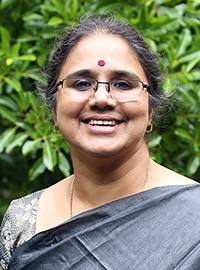
Srivardhini K Jha, Vasanthi Srinivasan
COVID-19 has forced companies, both big and small, to go virtual. The initial weeks of working in this new paradigm were challenging—companies grappled with connectivity issues; employees struggled to carve out space and time for work in their home environments, and teams acclimatized to an utterly virtual mode of collaboration. As weeks have gone by, many of these problems have been ironed out, and a new work rhythm is starting to take root. While the anxiety of lower productivity and longing for water cooler conversations haven’t gone away, there is an increasing acknowledgement of the benefits of going completely virtual. Prof. Srivardhini K Jha, from the Entrepreneurship area, and Prof. Vasanthi Srinivasan, from the Organizational Behavior & Human Resources Management area, at IIMB,list three unanticipated but important benefits of virtual work–inclusivity, democratization, and objective performance measurement, in an article in DataQuest.
Read More

Ritu Tripathi, Rahul De
With the proliferation of artificial intelligence, machine learning, cloud and blockchain, over the last decade or so, there has emerged a concern in both academic writing and the popular press about the “future of work.” Will office work as we know it remains the same? Will the internet-based Gig Economy stay the same? Will organizations and their structures change significantly? Prof. Ritu Tripathi, from the Organizational Behavior & Human Resources Management area, and Prof. Rahul De, from the Information Systems area, at IIMB, explore the answers to some of these questions, in an article in People Matters.
Read More

Haritha Saranga
Sreelata Jonnalagedda
As the COVID-19 crisis is unfolding in front of us, the lifestyle we have taken for granted has begun to crumble right in front of our eyes. Large scale, high-technology, and a flatter world have been the pivotal principles of the business models we used to produce the creature comforts on this planet. The unprecedented circumstances we are faced with beckon us to examine the sustainability of the very principles that got us here. Instead of looking at the current crisis as a onetime affair, it is useful, perhaps prudent even, to force a needed change in our lifestyles and the way we operate our economies. Prof. Haritha Saranga, from the Production & Operations Management area and Prof. Sreelata Jonnalagedda, from the Marketing area, at IIMB, examine three ideas of sustainability to rebuild the economy, in a Thought Leadership article in Forbes.
Read More
Venkatesh Panchapagesan
As millions of small businesses and households plan for the post-COVID world, many are likely to lean on the only asset that they own — land — to secure themselves, financially. However, the current state of our land record keeping has not kept up with changes in time and our aspirations for the economy. Prof. Venkatesh Panchapagesan, Chair of the Real Estate Research Initiative (RERI) and faculty from the Finance & Accounting area at IIMB, calls for changes that are long pending and presents a simple approach to clean up land records quickly, in an article in Business Standard.
Read More
Vidhya Soundararajan
The coronavirus-related lockdown has made more than 130 million people in India jobless. Many of them are the migrants returning to their home states. During the last few weeks, some states, particularly the traditional out-migrant states, have issued ordinances to relax or suspend labour laws significantly. These changes are aimed at removing potential impediments to employment generation to absorb the unemployed — especially the returning migrants — and/or attract foreign direct investment. Prof. Vidhya Soundararajan, from the Economics & Social Sciences area at IIMB, suggests measures that will provide firms with greater flexibility without undercutting the welfare of workers, in an article in Hindustan Times.
Read More
Venkatesh Panchapagesan
Land is the most preferred asset for individuals and lenders in the country. However, despite its appeal to both savers and borrowers, land in India has never been the engine of growth that many economists had imagined. And now, more than ever, it will be land, that millions of returning migrants and struggling micro, small and medium enterprises will depend on to survive one of the most challenging periods in post-Independence India. In a two-part article in the Business Standard, Prof. Venkatesh Panchapagesan, Chair of the Real Estate Research Initiative (RERI) and faculty from the Finance & Accounting area at IIMB, says that while the need to unleash the power of the land was never in doubt, the coronavirus crisis has allowed us to make it happen now.
Read More

Srivardhini K Jha, Rishikesha T Krishnan

Kanchan Mukherjee
Based on a psychological experiment, Prof. Kanchan Mukherjee, from the Organizational Behavior & Human Resources Management area at IIMB, explains that we do not have an adequate intuitive grasp of the probabilities of uncertain events. Such psychological biases can profoundly influence our risk perceptions that can potentially lead to poorly-understood circumstances and disastrous consequences, as occurred with COVID-19 pandemic.In this article in Indian Express, he says it is imperative that our policymakers become aware of the risk perception pitfalls, reduce their susceptibility to biases and base their decisions on objective and rational risk considerations.
Read More
Rajeev R. Tripathi
The novel coronavirus is here to change the world in multiple dimensions. One of these dimensions is – the Internet as infrastructure. With nation-wide lockdowns, initiatives such as work-from-home (WFH), online teaching and learning, digital payments, online health care, etc. are being taken and implemented. On the other hand, data from over-the-top (OTT) media service players such as Netflix, Amazon Prime, YouTube, etc., shows an unprecedented surge in content consumption. Doctoral scholar Sudha Madhavi Dastrala and Prof. Rajeev Tripathi, from the Production & Operations Management area at IIMB, argue that there is a need for temporary prioritisation policies and ad-hoc networks so that utilisation of the network is maximised as per the given crisis, in this article in Economic Times.
Read More
Rupa Chanda
The Finance Minister recently announced the first tranche of a ₹20 trillion stimulus package with measures touching upon key segments of the economy—micro, small and medium enterprises (MSMEs), real estate, construction, shadow banking, which were already in bad shape and are now in dire straits. Prof. Rupa Chanda, from the Economics & Social Sciences area at IIMB, highlights the importance of two aspects—access to affordable credit and capacity expansion that are addressed by the proposed measures and which are validated by recent empirical studies on MSMEs, in an article in Business Standard.
Read More
Shabana Mitra
Sharing a border with Maharashtra has meant that the risk is higher for north Karnataka as Maharashtra is the worst affected state by COVID-19 in the country. In an article in Forbes India, Prof. Shabana Mitra, from the Public Policy area at IIMB, says this factor along with high population density, poverty, poor health facilities and lack of doctors has dealt a double blow to vulnerable people in the region. .
Read More
Vivek Moorthy
In an article in Mint, Prof. Vivek Moorthy, from Economics & Social Sciences area at IIMB, identifies several factors for huge job losses, particularly in the manufacturing sector due to the COVID-19 calamity, and calls for attention to India’s soaring unemployment rate, an enormously vital yet hugely neglected matter. He believes that the emphasis on trade as the main engine of growth and creation of good jobs is somewhat misplaced and suggests ways to ease work pressure and save some manufacturing jobs.
Read More
Rishikesha T Krishnan
With over 40 Central labour laws and 200 State-enacted laws and amendments, India is not an easy place to set up or run a business. The Uttar Pradesh government recently diluted its labour laws to provide flexibility to business and industry. However, from a global perspective, there is little evidence that relaxing labour laws alone will attract investment. In this article in the The Hindu BusinessLine, Prof. Rishikesha T Krishnan, from the Strategy area at IIMB, Kunal Kanungo, Managing Partner of Kanungo & Co, and Kapil Kanungo, Senior Consultant, Dalberg Advisors, present a better approach to help attract the right kind of investments and avoid possible exploitation of workers.
Read More
Rahul Dé
A massive number of people who are locked down are relying on digital means to work, communicate, read about the world, and express their concerns.It is anticipated that there will be a tremendous rise in digital technologies and their usage in the post-pandemic scenario. Along with this rise will come the risks. Given the pervasiveness of technology and the fact that there is no easy way to shun it, technology becomes an inscrutable and camouflaged threat, something to be wary of, only to be touched, not embraced. Prof. Rahul De, from the Information Systems area at IIM Bangalore, along with Prof. Neena Pandey and Prof. Abhipsa Pal, from IIM Visakhapatnam, get to the roots of this anxiety and suggest ways to cope with the risks, in this article in DataQuest.
Read More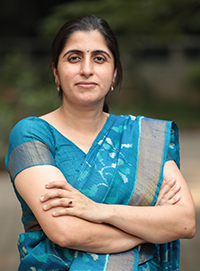


Manaswini Bhalla, Prateek Raj, Trilochan Sastry
The coronavirus pandemic and the subsequent lockdown has left millions of migrant workers in India stranded in their host states with a little social safety net. However, the question remains—who is responsible for the welfare of the migrant workers in India—the host state, the home state, or the Central government, or all of them? Prof. Manaswini Bhalla, from the Economics & Social Sciences area, Prof. Prateek Raj, from the Strategy area, and Prof. Trilochan Sastry, from the Decision Sciences area at IIMB, write that without clear accountability, advance planning and contingency arrangements for their welfare won’t be made, in an article in The Hindu BusinessLine.
Read More
Dalhia Mani
Start-up founders have captured India’s imagination, inspiring and serving as frontline warriors in our economic story. Despite the economic downturn and the strong blow to revenue, many start-up founders are optimistic about the future of their venture. They are living up to their reputation of being inspiring and undaunted in the face of odds while gearing up for a post-lockdown economy, write Prof. Dalhia Mani, and Sneetha Saji, doctoral student, both from the Entrepreneurship area at IIMB, in an article in The Hindu Business Line, based on findings of their study.
Read More
Rishikesha T Krishnan
Management education, in the traditional sense, has been under the scanner for some years. Several reasons include management education perpetuating an economic model focused singularly on wealth maximisation, leading to increased concentration of wealth, inequality and negative externalities such as climate change. Studies on the future of work and organisations predict a reduction in the number of managers required, as automation takes over routine decisionmaking and tasks. With many of the concerns of the pre-COVID era being reinforced, Kapil Viswanathan, Vice Chairman – Executive Committee, Krea University, and Prof. Rishikesha T Krishnan, from the Strategy area at IIMB, discuss the implications for management education, in an article in Mint.
Read More

Haritha Saranga
Sreelata Jonnalagedda
If did not happen on 4th May, sometime in the future the lockdown in India will have to be lifted to bring our economy back on its feet. Rather than employing ad-hoc mechanisms to manage the workforce, a planned and scientific method is necessary to minimise the rate of infections during the post lockdown period. Prof. Haritha Saranga, from Production & Operations Management area and Prof. Sreelata Jonnalagedda, from Marketing area, at IIM Bangalore, propose a workforce management strategy that makes use of the research published so far on Covid-19 spread statistics, in an article in Forbes. The proposed strategy is a combination of suppression and mitigation, intending to minimise the rate of infection while enabling organisations to gradually bring their activities back online.
Read More
Vidhya Soundararajan
Recent annual reports on Micro, Small and Medium Enterprises (MSMEs) indicate that the sector contributes to around 30% of India’s GDP, and based on conservative estimates, employs about 50% of industrial workers. The current coronavirus pandemic (Covid-19) lockdown will substantially disrupt the operations of these MSMEs due to their dependence on the cash-economy that is severely hit by the lockdown, the physical non-availability of workers, and restrictions in the availability of raw materials and transport infrastructure. This will have substantial ramifications throughout the economy, and therefore, a robust policy response is essential. Prof. Vidhya Soundararajan, from the Economics & Social Sciences area at IIMB, recommends ways how Indian policy can respond to this crisis in an article in Hindustan Times.
Read More
Vivek Moorthy
As the count of coronavirus cases and fatalities mount, and the economic catastrophe worsens, one should step back to examine all of those who bear some responsibility for this grave calamity. The cover-up by Chinese officials — who forced the whistleblowing martyr doctor Li Wenliang to sign a retraction in early January — has justifiably led to scathing criticism of the Chinese government and tributes to him. In an article in Business Standard, Prof. Vivek Moorthy, from the Economics & Social Sciences area at IIMB, highlights China’s long-standing dubious economic practices and points to its “cheerleaders”.
Read More
Pulak Ghosh
India is in the second phase of national lockdown. The country took the drastic step when it had recorded only 10 deaths. It seems it is giving us clear benefits in the fights against the Covid-19 pandemic. A vaccine is 12-18 months away, but, in the interim, the lockdown cannot be a one-size-fits-all approach. The problem with the current Covid crisis is the significant demand contraction that has been unleashed with the lockdown massively restricting social consumption. Prof. Pulak Ghosh, from the Decision Sciences area at IIMB, writes that fiscal support is a must to speed up economic recovery, in an article in Business Standard.
Read More
Vivek Moorthy
The human calamity due to COVID-19 has also led to an economic calamity. We are undergoing a colossal aggregate shock—barring a massive surge in demand for corona-related medical goods and services, and shifts to more online purchases. How best to cope with this shock? Based on macroeconomic principles, also applicable to India, Prof. Vivek Moorthy, from the Economics & Social Sciences area at IIMB, makes a ground-zero policy suggestion in this article in Mint. He says the finance minister should announce a reduction of 30% in wages and pensions for all government and quasi-government employees for the remaining fiscal year, and recommends that private firms do the same.
Read More
Rishikesha T Krishnan
The Covid-19 pandemic has brought a new sense of urgency to innovation efforts. We seem to have the different elements needed for such innovation, but we need to find ways of orchestrating these elements for quick results. And, this success needs to be carried beyond vaccines to other deep tech domains as well. Covid-19 provides a unique opportunity to institutionalise a blueprint for such deep-tech innovation in India. This requires a tango of government, universities and industry. In an article in The Hindu BusinessLine, Prof. Rishikesha T Krishnan, from the Strategy area at IIMB, suggests that the key lies in matching national priorities with capabilities, funding projects without the usual red-tape, facilitating collaboration, and easing barriers to licensing of intellectual property.
Read More
Sreelata Jonnalagedda
Just like new technologies, new ideas too need time to diffuse through a community, writes Prof. Sreelata Jonnalagedda from the Marketing area, in this article in Forbes India. Early adopters of social distancing, she explains, are likely to be the ones who feel most vulnerable and laggards will be the ones who perceive themselves to be least vulnerable to Covid.
Read More

Chetan Subramanian , Venkatesh Panchapagesan
The COVID-19 pandemic is not just a health crisis; it is in equal measure an economic crisis, the consequences of which could potentially be catastrophic. As policymakers scramble to contain the outbreak’s economic fallout, the Reserve Bank of India (RBI) must play a critical role in financing both the government and private sector. Prof. Chetan Subramanian, from Economic & Social Sciences area and Prof. Ventakesh Panchapagesan, from Finance & Accounting area, at IIMB, observe that addressing the economic fallout would require a massive effort on all fronts, in an article in Mint. The central bank must do what it takes, even if it means temporarily morphing into an asset reconstruction company. It is time for us to follow pragmatic and not dogmatic economics.
Read More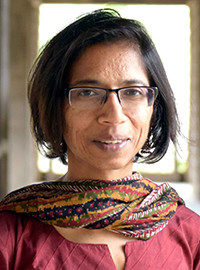
Hema Swaminathan
The coronavirus pandemic will almost certainly exacerbate existing inequalities in society. Much has been written about the impact on migrants and the informal sector. But the other dimension of inequality that is likely to be impacted but has received less coverage is that along the lines of gender. While all vulnerable populations will suffer, a gender lens is warranted as women are ranked lowest in the hierarchy of caste, class, or religious stratification. While there is a lot of uncertainty about the global and national trajectory of coronavirus and how it will impact the economy and society, Prof. Hema Swaminathan, from the Public Policy area at IIMB, explains that lessons from previous crises can provide a rough blueprint of what to expect and how to deal with it, in an article in The Wire.
Read More
Sourav Mukherji
As we remain locked inside our houses, tracking the number of coronavirus related infections and deaths around us and across the world, attending official meetings and socializing with friends over video, several questions are possibly lurking in our mind – how is this going to pan out, what will happen next and how should one respond to the situation? Prof. Sourav Mukherji, from the Organizational Behavior & Human Resources Management area at IIMB, discusses strategies to tackle the uncertainty that thrives in times like this, in an article in Forbes. He suggests we need to be positive, give our best and learn every day. “We need to keep playing harder so that when the final whistle blows, we are the winners”.
Read More
G. Raghuram
Given the lockdown and physical distancing requirements, education is leveraging digital modes now more than ever. Considering the user experience so far, it will lead us to a new normal, where there is greater confidence in leveraging digital learning. In the specific context of the IIMs, a slew of new programmes with a focus on inclusivity in delivering quality education in a digital or even blended mode will become prominent. Prof. G Raghuram, Director, IIM Bangalore, explains that as students turn into becoming professionals, ‘work from home’ options would increase while salary slabs for entry-level managers will most likely drop in the forthcoming years, in an article in Times Now.
Read More
Rahul Dé
Indian government has taken stern measures to control the coronavirus that is haunting the planet—a 21-day lockdown that has forced everyone in India to stay indoors and avoid all social contact. Migrant workers all over India are facing the greatest challenge as they are away from home and don't have an 'indoors' that they can stay locked in. The mobile phone remains as one of the few devices that enable people to talk to others in remote locations, inquire about facilities, be able to ask for help, make payments, be entertained, and much more. Based on his research, Prof. Rahul Dé, from Information Systems area at IIMB, puts forward a few recommendations for the government and agencies to keep in mind to enable people to rely on mobile phones and mobile payment technologies, in an article in the Business World.
Read More
Prateek Raj
During a period of emergency, such as the coronavirus pandemic, the public needs immediate assistance. Governments need the necessary infrastructure of last mile and last person connectivity to provide such support, and the universal access to bank accounts and digital payments can go a long way in making such immediate assistance possible. Prof. Prateek Raj, from the Strategy area at IIMB, finds out how India is placed on these parameters, based on The World Bank Global Findex Database, as he puts forth intriguing facts in an article in the Business World.
Read More
Amar Sapra
As the government begins lifting India’s lockdown restrictions, many companies have either resumed production or are planning to do so in the near future. As has been widely reported, unprecedented challenges that exist in both internal and external supply chains make it extremely difficult to resume and continue production. From a management perspective, the most critical challenges are procuring raw material supplies, a shortage of workers, and arranging both inbound and outbound transportation, explains Prof. Amar Sapra, from Production & Operations Management area at IIMB, in an article in Mint. He remarks that quick adjustments, along with some ingenuity, may allow companies to start production and restore supplies.
Read More
Gopal Naik
The large-scale spread of coronavirus is affecting every aspect of life, posing humungous challenges for countries. Many businesses and institutions are shut for unknown periods, significantly affecting all economic and social activities. The coronavirus lockdown has compelled all concerned to introspect on infrastructure and technology readiness in rural areas to address disaster management and business continuity requirements. Prof. Gopal Naik, from Economics & Social Sciences area at IIMB, and Narasing Rao, consultant, IIMB, point out several factors that can transform the quality of life in rural areas—good telecom and data connectivity, new online services in health, education, market, business sectors, efficient power connectivity, and more.
Read More
Rahul Dé
Three IIM professors, including IIMB’s Prof. Rahul Dé, assess the first, second and third-order implications of the lockdown, which has forced companies to go digital. Many of these effects could be lasting, and change the way we live and work.
Read More
A Damodaran
With COVID-19 gripping the world, nations and people are living with various fears: a shortage of essential goods, lack of a vaccine, failing economies, hollowed-out job markets, and more. However, at this moment in India and elsewhere, it is about crushing the fear of the economy curve created by the pandemic, writes Prof. A Damodaran, from the Economics & Social Sciences are at IIMB, in an article in Forbes India. He suggests that for pandemic-related fears to be addressed, door-to-door delivery of cash, essential goods, health and psychosocial services must be deployed.
Read More
Vasanthi Srinivasan
With many organizations announcing working from home, employees are struggling to adjust to this new rhythm of work. Prof. Vasanthi Srinivasan, from the Organizational Behavior & Human Resources Management area at IIMB, writes that working from home is a shift in role identity that also impacts the self-definition of who they are and their success in a new context, in an article in The Hindu BusinessLine. She proposes six steps that can enable employees to manage this role shift.
Read More